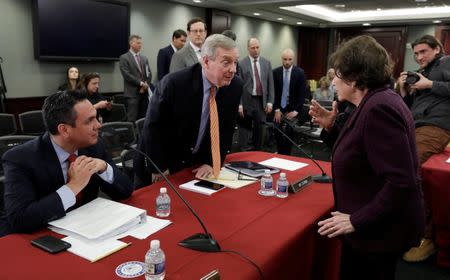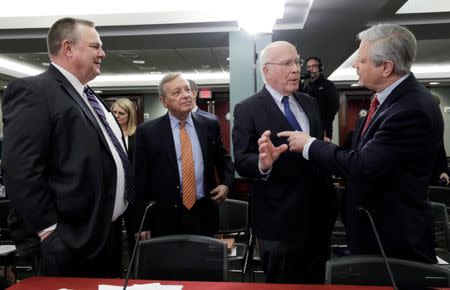Beyond Trump's wall: U.S. Congress tackles border security
By Richard Cowan and Susan Cornwell
WASHINGTON (Reuters) - President Donald Trump's planned "great, great wall" began morphing into a physical barrier and an array of high-tech gadgets in congressional talks launched on Wednesday to forge a compromise on security at the U.S. border with Mexico.
Although there were no guarantees a deal could be reached by a Feb. 15 deadline, lawmakers on both sides showed a willingness to avoid ultimatums and seek common ground.
Some negotiators from Trump's Republican Party avoided uttering the word "wall" during the 17-member border security panel's first session on Wednesday. They spoke of a mix of enforcement tools, as Democrats had urged.
The long, contentious debate over one of Trump's biggest 2016 campaign promises - a concrete border wall financed by Mexico - entered a new stage with the committee's launch last week ending a 35-day partial closure of the government.
Lawmakers have an opportunity, Republican Senator Shelley Moore Capito said, to choose “all of the above” for border investments, “including physical barriers where it makes sense.”
Even Trump's early morning Twitter message on the committee's urgent work left some wiggle room on the wall.
"If the committee of Republicans and Democrats now meeting on Border Security is not discussing or contemplating a Wall or Physical Barrier, they are Wasting their time!" he tweeted.
The Feb. 15 deadline was imposed when Trump agreed last week to end the shutdown and give lawmakers another chance to forge a deal or face another closure.
At a news conference, Democrats handed out a fact sheet they described as their opening proposal. It included no money for a wall or physical barriers, but House Appropriations Committee Chairwoman Nita Lowey said: “Everything’s on the table.”
But she added: "Smart border security is not overly reliant on physical barriers, which the Trump administration has failed to demonstrate are cost effective compared to better technology and more personnel."
HIGH-TECH INVESTMENT
Instead of Trump's wall, Democrats have been urging investment in high-tech equipment to enhance border security, such as drones, sensors and advanced scanning equipment, along with additional law enforcement personnel.
On Dec. 22, about a quarter of the U.S. government closed, leaving 800,000 federal workers without pay for the next five weeks. The shutdown was prompted by Trump's demand that any shutdown-ending legislation contain $5.7 billion for his wall.
Mexico long ago refused to pay for it. Trump now wants U.S. taxpayers to foot the bill for a project that some estimates have shown could cost more than $23 billion. He says it is needed to keep out illegal immigrants and drugs.
Democrats broadly support more border security, but oppose the wall and stood firm against Trump's demand that money for it be part of a bill to end the shutdown. Trump temporarily gave up that demand on Friday and agreed to the committee.
Congress has until Feb. 15 to pass a package to fund several federal agencies through Sept. 30. That gives lawmakers little more than a week to settle their differences and leave time for both houses of Congress to debate and vote on any deal.
Trump said on in an interview with the Daily Caller on Wednesday that it was highly unlikely he would be willing to include the status of "Dreamer" immigrants in the border security negotiations.
Trump, in an unsuccessful attempt to secure wall funding and end the government shutdown earlier this month, had offered temporary protection from deportation for the immigrants brought to the United States illegally when they were children.
A top House Democrat said on Tuesday he did not expect the issue to be part of the current negotiations.
Trump has moved off his demand for a 2,000-mile (3,200-km) concrete barrier and now talks about either a wall or "physical barrier" on only some parts of the border. Democrats in the past have backed "fencing."
The Department of Homeland Security says 654 miles (1,050 km) of pedestrian and vehicle barriers already exist.
Democrats repeatedly have voted for $1.3 billion in added border funds for this year. Late last year, Trump even signaled his willingness to go along with that figure before reversing course and insisting on $5.7 billion for his wall.
Wednesday's committee meeting might be the only public session, with future sessions likely behind closed doors.
If lawmakers do not craft a deal Trump likes, he has threatened two possible next steps: another shutdown, or declaring a "national emergency" and taking existing funds appropriated by Congress for other purposes - possibly from the Defense Department, for example - to build his wall.
There is bipartisan opposition in Congress to the emergency strategy, which likely would spark a legal challenge.
(Reporting by Richard Cowan and Susan Cornwell; Editing by Kevin Drawbaugh, Howard Goller and Peter Cooney)





